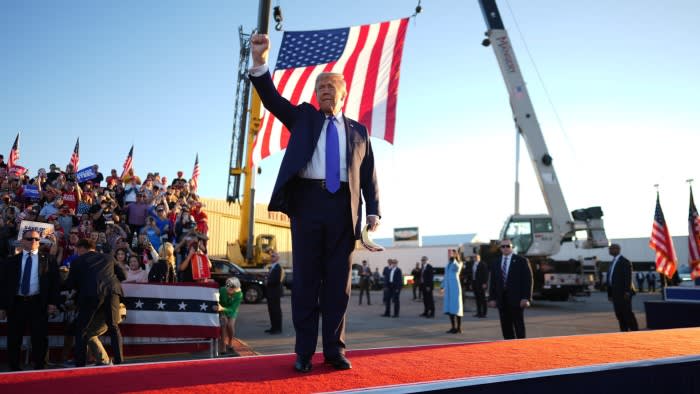Unlock the US Election Countdown newsletter for free
The stories that matter on money and politics in the race for the White House
The paragraph that follows is the most reluctantly written of my career.
Donald Trump qualifies as a titanic success in politics. And not because he got himself elected to the world’s highest office. Someone does that every leap year. It is because he achieved the hardest thing in government, which is to bind one’s successors. He moved the consensus on a big issue — trade — until the next president couldn’t go back, or didn’t want to. Hence the tariffs and subsidies of Bidenomics. Hence the spread of protectionism elsewhere in the world. Most leaders who change the “common sense of the age” need consecutive terms (Reagan) or a crisis (Thatcher) or both (FDR). Trump needed neither to turn an apostasy into an orthodoxy.
Whatever happens next week, we will be living in Trumpland for decades. Yes, I’ll manage, thanks. Besides some marginal trimming of restaurant wine lists, it is odd how little an era of global economic fragmentation incommodes a man. But “we” also encompasses the unknown millions who won’t now be elevated out of low income through trade, as so many Chinese were in the decades either side of the millennium. It includes the political class of Europe, too, which must decide whether to match the American fence. Trump could lose on Tuesday and still untie the west over time via his protectionist successors.
Rather than mope, wonder how he did it. How does profound and lasting change happen? How does one leave a mark?
On YouTube, videos abound of Trump from the 1980s. He is measured, even soft-spoken, until the subject of trade comes up. At that point, a new edge enters the voice and a hint of a snarl contorts the face. Japan is the main target (“They come over here, they sell their cars, their VCRs”) but Kuwait gets some too. And this is on things like Oprah. In temporal terms, we are almost as far from this footage as it was from D-Day. But he still says the same things now about the same subject with the same vehemence.
This is almost all he cares about. (Immigration is a distant second.) This is the thread running through his more than four decades on the public record: an intense belief that to run a current account deficit with another nation is to “lose” to it. We can mock the primitivity of the economics. We can mourn the wealth that protectionism will destroy, or rather will prevent from being made. But at least we have the outline of an answer to the question above.
The secret to leaving a legacy is monomania. It is the prioritisation of one theme over the conscientious management of everything. And the secret to innocuousness is the reverse. If there is a counter-Trump, it is Bill Clinton, a sublime generalist, his own wonk on most issues, an intelligent tinkerer of tax credits here and diplomatic relations there, but also one of the more forgettable two-term presidents. He left office with sky-high ratings but no new settlement in public thought. How come? Distraction through scandal? Trump had that. No obvious crisis to fix? Trump took over in 2017, which wasn’t a living hell either. In the end, Clinton just didn’t have a paramount obsession.
Over time, Isaiah Berlin came to regret writing The Hedgehog and The Fox. Readers took too seriously his playful distinction between two kinds of mind: the rigid and the supple, the one that dwells on a central idea and the one that is more (to introduce a third creature) magpie-like. Dostoevsky, who saw things through a particular moral lens, was a hedgehog, Shakespeare all fox, and so on. What was meant as a bit of end-of-evening intellectual sport between All Souls types became a taxonomy that moderately informed laypeople can quote.
Well, for a reason. It clarifies a lot. Leaders glamorised as “change-makers” are often bores who grind away at one groove: rolling back the state, or joining the European project (Ted Heath was an immense hedgehog) or leaving it. Watch Trump fulminate about trade in the 1980s, and again 40 years later. The narrowness of his concerns would invite a chuckle, if they hadn’t prevailed.
Email Janan at janan.ganesh@ft.com
Find out about our latest stories first — follow FTWeekend on Instagram and X, and subscribe to our podcast Life and Art wherever you listen









